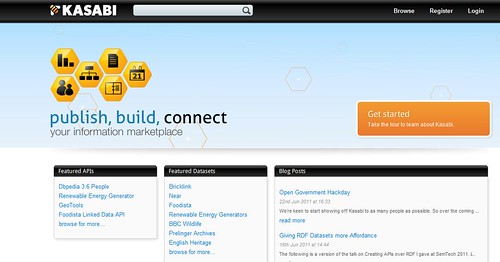The following guest post is by Leigh Dodds, programme manager for the Talis platform
Talis has recently launched a new data marketplace called Kasabi. In this post I wanted to explore why Kasabi should be of interest to the Open Data community.
Our goal with Kasabi is to help make data as easy to use, and as easy to publish as possible. We also want to help people unlock the value inherent in data, whether that means making it freely available – in order to drive innovation – or to explore more commercial models. With this in mind, Kasabi provides more than just a directory of datasets: it provides a complete platform for the hosting and publishing of Linked Data.
From the outset our intent has been to support a range of different publishing models in Kasabi. Talis has a long track record in supporting the publication of Open Data, most notably via the Talis Connected Commons scheme. The scheme, which provides free use of the Talis Platform for public domain data, has most recently been used to support the JISC LOCAH project. The scheme will shortly become a formal part of Kasabi, meaning that we’re at last able to provide a complete self-service environment to support the publishing of truly public domain data.
Data hosting in Kasabi is free. This means anyone can use Kasabi as a way to publish Open Data for others to use. A number of the core APIs and services, including basic Linked Data publishing will also always be a free part of the service. Data is most useful when it can be quickly and easily accessed and linked to other sources. This means the service provides a completely free platform for sharing Linked Open Data.
While many developers want access to raw data downloads that they can process and analyse data locally, many others would prefer to have access to APIs over that data, avoiding the costs of running their own infrastucture. This is the area which we’re focusing on with Kasabi. As a commercial service we clearly need to cover our own costs and our intention is to do that by charging for use of specific APIs, e.g. at high-volumes.
But, by providing flexibility about who pays, we can still support Open Data and services that are freely available. In Kasabi there will be two options. Firstly, as a developer you can pay for your own usage of the Kasabi APIs. Secondly, the data owner will be able to cover all of the usage costs that apply to their data. This model means that both the data and services will be free at the point of use. We think this model will work well for government and public sector organizations that are looking to provide access to APIs as well as raw data downloads.
Kasabi will also support publishing of commercial data. But our goal is to require a free usage level for all data that is offered within the marketplace. So even here we hope that the service will support our collective goal of making more data, more accessible.
But commercialisation of data is not totally against Open Data principles. MusicBrainz has long operated a dual model of providing Public Domain data for curated by its community, coupled with paid services for commercial organizations. This lets the MusicBrainz community continue to benefit from open data and a free service, whilst requiring organizations to pay for the value that has been created. This is a sustainable approach that could be replicated in other communities, and is something we’re keen to support in Kasabi.
With free hosting, free services, a sensible set of terms and conditions, and plans to support data publishing models that will embrace a number of different approaches to open data, we think that Kasabi should definitely be of interest to the Open Data community. And we’re excited to see what you can create! We’ve just entered early public beta but the basic features are all in place: anyone can come, sign-up and starting publishing and using data. We’ve also seeded the platform with a number of new and existing open datasets to let people start playing with the tools.
We’d love to hear your feedback both on the service itself, and our plans to continue to support the Open Data movement.
Theodora is press officer at the Open Knowledge Foundation, based in London. Get in touch via press@okfn.org










2 thoughts on “Open data and Kasabi”
Comments are closed.